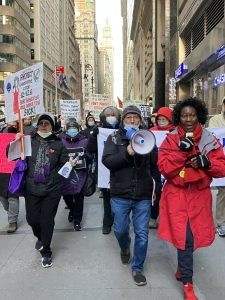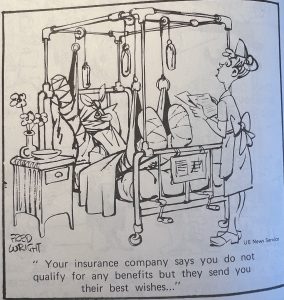HEALTH CARE A MAJOR ISSUE AS UFT RETIREES OUST LEADERSHIP BY A WHOPPING TWO-THIRDS VOTE
By Paul Becker
With health care for retirees the big issue, a major step forward in the fight for democratic unionism was registered last week when a rank-and-file slate swept the elections for officers and delegates of the retirees chapter of the United Federation of Teachers. The chapter vote has implications of trouble for the leadership of the UFT, which through its Unity caucus has been running the union since its founding nearly 65 years ago. The current UFT president, Michael Mulgrew, has held office for the past 15 years. He and the officers of the entire union are up for election next year.

NYC municipal retirees march down Broadway protesting the city’s ongoing campaign to push them into a for-profit, privatized Medicare Advantage plan. Photo by Joe Maniscalco, Workbites
The Retiree Advocate slate, ran up an impressive victory, scoring nearly two-thirds of the more than 27,000 votes and ousting the Unity caucus leadership of the retirees chapter. The UFT is New York’s Local 2 of the American Federation of Teachers.
Resentment against the UFT leadership has been building slowly during the past few years over the union’s acceptance of substandard contracts for teachers, paraprofessionals, and other New York City school employees. A growing number of union members also resent Unity caucus’ cling to power through a well-oiled political machine, abandoning principles of democratic unionism and playing ball with local and state politicians rather than fighting for its members. Unlike many unions, retired members can vote in union-wide elections and, until recently, have provided an important base of support for Unity caucus.
The key issue in this campaign was the attempt by UFT leaders, acting with the heads of other large municipal unions to force their members out of traditional Medicare and into a so-called Medicare Advantage plan. (The insurer for city workers would be the health insurance mega corporation, Aetna.) The move would affect hundreds of thousands of retired city workers. Over the years, these workers, including teachers, made concessions on other benefits over the promise that, upon retirement, they would have fully paid health care with the gap between Medicare payments and costs of medical treatments covered by the city. As such, teachers are covered by Medicare with GHI as the secondary insurer. The premiums for this secondary insurance were reimbursed. Under the new proposal, if teachers elected to stay with traditional Medicare, this reimbursement would be dropped, costing them a substantial amount of money that retirees with their limited income could ill afford.
The so-called Medicare Advantage plans, despite being sold under the label “advantage” and putting forth some enticements like free gym memberships, have some very important disadvantages. It is run by private corporations whose principal goal is bottom-line profits rather than making patients healthy. While some 85 to 90 percent of American doctors accept Medicare payments, under corporate Medicare Advantage, you have to choose from their panel of doctors. Thus, many teachers would have to abandon the doctors they have had over the years whom they have trusted and who know them to switch to a doctor they do not know.

Cartoon by Fred Wright. Courtesy United Electrical, Radio & Machine Workers (UE)
Even more important, Medicare Advantage plans require pre-approval for many medical procedures. If pre-approval is denied, they won’t pay for it. The patient can appeal but it can still be denied, or even if it’s approved, it often takes time when a speedy treatment is necessary. During the campaign of teachers and other city workers against the planned switch, a number of people have come forward to tell of their experiences when the delay has resulted in severe damage including death to a family member or friend. Medicare, on the other hand, usually accepts the judgment of the doctors, except in cases of outright fraud. My own doctor, an outstanding physician who is recognized as one of New York City’s best cardiologists, complained to me that he now has to spend nearly half his time on the phone arguing with private insurance companies about the necessity of a medical treatment for patients who have been denied coverage.
These private insurance plans have been reaping fat rewards since Congress, about 30 years ago, allowed them to collect subsidies from Medicare that should have gone to health care for people on the government program. And recently, some of them have been caught defrauding Medicare by billing for services that were never delivered. Little wonder that giant insurance companies now crowd the field as they discover “there’s gold in them thar hills.”
Several months ago, a state court ruled that the city could not change the health care plan promised to retirees. The ruling was upheld by the New York State Appellate Court but New York Mayor Eric Adams has said he would appeal to the state Court of Appeals, the highest court in the state.
The win for the Retiree Advocate slate pledged to fight against forcing retired school employers into these private plans could have important implications not only for next year’s elections for union-wide UFT officers but for other unions of city workers which have endorsed the plan despite the growing objections of their retirees.


